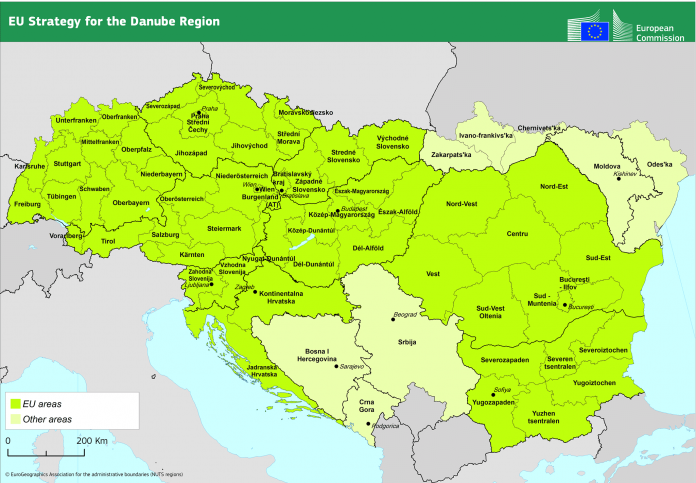The EU Strategy for the Danube Region (EUSDR), formally adopted by the EU Council of Ministers on 24 June 2011, serves as a macro-regional platform aimed at fostering synergy and coordination among existing policies and initiatives within the Danube Region.
The EUSDR involves 14 countries from the Danube River Basin, nine of which are EU member states (Austria, Czech Republic, Hungary, Bulgaria, Croatia, Slovenia, Romania, Slovakia and Germany), while the other five are non-EU countries (Bosnia and Herzegovina, Moldova, Montenegro, Serbia and Ukraine).
The Danube Strategy offers numerous opportunities to promote integration and growth across countries with varying levels of economic development, united by the Danube River, one of the world’s most international rivers with significant hydrological and ecological importance. In addition to strengthening ties among EU member states, the Danube Strategy’s geopolitical position allows for enhanced cooperation between the EU and its neighbourhood.
The EUSDR is structured around four main thematic pillars and 12 Priority Areas:
- Connecting the Region (Priority Areas: PA 1a Waterways Mobility, PA 1b Rail-Road-Air Mobility, PA 2 Sustainable Energy, PA 3 Culture & Tourism)
- Protecting the Environment (Priority Areas: PA 4 Water Quality, PA 5 Environmental Risks, PA 6 Biodiversity, Landscapes and Air & Soil Quality)
- Building Prosperity (Priority Areas: PA 7 Knowledge Society, PA 8 Competitiveness of Enterprises and PA 9 People & Skills)
- Strengthening the Region (Priority Areas: PA 10 Institutional Capacity & Cooperation, PA 11 Security)
Each participating country has a National Coordinator responsible for overseeing its involvement in EUSDR implementation. The role of the National Coordinator includes promoting the Strategy and informing relevant stakeholders at the national level. Additionally, the European Commission established the Danube Strategy Point, a secretariat responsible for the coordination, communication and evaluation of the Strategy.
Since its inception, the Strategy has led to or further developed several significant projects, including major plans for the restoration and maintenance of navigation routes, the creation of environmental protection networks, the development of joint methodologies for assessing and managing natural disaster risks and the establishment of a network for enhancing security along the Danube. EUSDR has also promoted cultural and research dialogues across the region and strengthened collaboration with existing international organizations (such as the International Commission for the Protection of the Danube River – ICPDR and the Carpathian Convention). The establishment of the Danube Financial Dialogue has become a successful platform for fostering partnerships and involving financial institutions in promoting regional projects.
In October 2022, the Danube Youth Council was created to institutionalize youth involvement in all EUSDR bodies, ensuring their voices are heard and encouraging active participation in macro-regional policymaking.
The EUSDR operates on the principle of an annual rotating presidency. Austria holds the presidency in 2024, with a focus on implementing objectives and activities from the Action Plan and integrating EUSDR priorities into relevant programmatic documents (embedding).
Contacts:
- Tatjana Bošković, Head of the Directorate for Horizontal Issues and Macro-Regional Cooperation, email: tatjana.boskovic@mep.gov.me
- Tijana Đoković, Senior Adviser in the Directorate for Horizontal Issues and Macro-Regional Cooperation, email: tijana.djokovic@mep.gov.me


